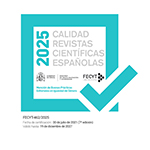Miradas “noir” de Barcelona: desde Vázquez Montalbán y Mendoza a Riera
Abstract
Casting contemporary events in an incriminating light, the detective novel genre in Spain pays more attention to the social portrait than to solving the mystery. Manuel Vázquez Montalbán and Eduardo Mendoza present their readers with a fragmented world, an incriminating view of the social reality in Barcelona which focuses on the working class, the lack of hope for the youth and the exploitation by the rich and powerful. The first one, obsessed with the dynamics of the urban process, its inner tensions, and the impact of the evolution of capitalism on the historic memory of the lower classes, makes his detective leave town. Mendoza explores the relationship between the human mind and the urban environment, which turns out to be a metaphor for a site or container of power. His detective, a mad “pícaro”, refuses to follow any norm of conduct, unlike Marlow or Spade. Carme Riera, in her debut in this genre, acknowledges her predecessors, but opts to provide the reader with some new insights. Riera, concerned with today’s lack of moral and social values, breaks with a number of stereotypes, such as locations, the educational system, the youth, the police, or those with some sort of social status.Downloads
Article download
License
In order to support the global exchange of knowledge, the journal Dicenda. Cuadernos de Filología Hispánica is allowing unrestricted access to its content as from its publication in this electronic edition, and as such it is an open-access journal. The originals published in this journal are the property of the Complutense University of Madrid and any reproduction thereof in full or in part must cite the source. All content is distributed under a Creative Commons Attribution 4.0 use and distribution licence (CC BY 4.0). This circumstance must be expressly stated in these terms where necessary. You can view the summary and the complete legal text of the licence.









